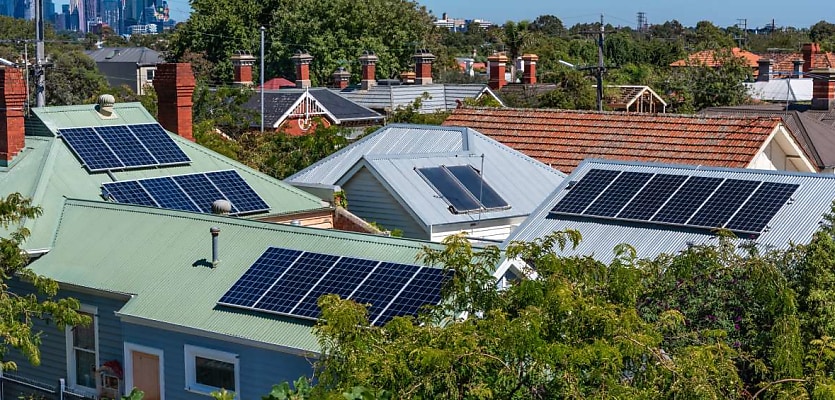With experts warning of hotter summers with more intense heatwaves, home owners and renters are placing more emphasis on the amenities that drive property values.
Air conditioning and solar have become key features in property as renters’ priorities shift and home owners look to boost property value.
A recent study from Domain found that air conditioning had surged into the top five search terms in almost every major city across the nation, becoming the top search term in Sydney and Adelaide.
Brisbane and Perth followed suit, with air conditioning ranking as the second most popular search term, while it placed fifth in Melbourne.
Despite this growing demand, nearly 75 per cent of landlords have not considered supplying air conditioning to their properties as a priority.
Nationwide, only 35 per cent of the properties available on Domain include air conditioning.
According to Domain’s chief of research and economics, Nicola Powell, renters are looking towards properties that are better equipped.
“Renters are clearly signalling what they want and need – and as temperatures rise, air conditioning is no longer a luxury, it’s a necessity,” said Powell.
“The data shows a growing disconnect between renter expectations and investor priorities, and with the hotter summers ahead, the gap is only set to widen.”
With the cost of these amenities, home owners are seeking ways to soften the blow and add value to their properties, and have found a solution through the addition of solar panels.
Cotality data showed that homes with a solar power system were valued at 2.7 per cent more than homes without, equating to an increase in value of approximately $23,000.
Nationally, data showed that 29 per cent of houses have rooftop solar panel systems installed.
Bungarribee in Sydney’s western suburbs leads the nation, with 96 per cent of homes in the suburb featuring rooftop solar panels.
Across the capital cities, Perth, Adelaide and Brisbane recorded over 40 per cent coverage, while Hobart and some regional areas sit at below 20 per cent.
The study found that buyers were willing to pay a consistent price premium, with properties in some areas seeing an uplift of around 6.9 per cent, or around $31,000.
Nationwide, Hobart recorded the highest growth in property value with solar panels, with property prices in the Tasmanian capital rising by 5.4 per cent.
According to senior director, banking and finance, at Cotality Australia, Tom Coad, buyers have been willing to spend more to acquire a more efficient home.
“Our findings highlight that homes with energy and efficiency upgrades are delivering not only long-term energy bill savings and comfort, but also measurable price premiums at a time when cost-of-living concerns are top of mind for Australians,” Coad said.
Cotality data showed that each additional Nationwide House Energy Rating Scheme (NatHERS) star on a property raised the value by around $10,000, or around 1.3 per cent.
While the NatHERS rating uses a 10-star rating system to provide energy efficiency data on new homes and major renovations, over 70 per cent of the nation’s housing stock has been sitting at below four stars.
The report said that underperforming homes in need of an upgrade represented a significant opportunity for home owners seeking to increase their property value.
The implementation of solar energy systems has become a widespread practice among new developments, with many now including solar panels as part of the standard building packages.
According to chair of the REIA’s Sustainability Working Group, Jacob Caine, the increasing demand for renewable energy systems highlights how cost-of-living pressures are influencing the property market.
“Australians are recognising the dual benefit of energy-efficient homes – reduced running costs and stronger long-term value,” Caine concluded.
ABOUT THE AUTHOR

Mathew Williams
Born in the rural town of Griffith NSW, Mathew Williams is a graduate journalist who has always had a passion for storytelling. Having graduated from the University of Canberra with a Bachelor of Sports Media in 2023, Mathew recently made the move to Sydney from Canberra to pursue a career in journalism and has joined the Momentum Media team, writing for their real estate brands. Outside of journalism, Mathew is an avid fan of all things sports and regularly attends sporting events across Sydney. Get in touch at







You are not authorised to post comments.
Comments will undergo moderation before they get published.